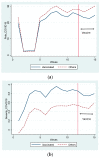Gender Differences of the Effect of Vaccination on Perceptions of COVID-19 and Mental Health in Japan
- PMID: 37112734
- PMCID: PMC10143812
- DOI: 10.3390/vaccines11040822
Gender Differences of the Effect of Vaccination on Perceptions of COVID-19 and Mental Health in Japan
Abstract
Vaccination has been promoted to mitigate the spread of the coronavirus disease 2019 (COVID-19). Vaccination is expected to reduce the probability of and alleviate the seriousness of COVID-19 infection. Accordingly, this might significantly change an individual's subjective well-being and mental health. We observed the same individuals on a monthly basis from March 2020 to September 2021 in all parts of Japan. Then, large sample panel data (N = 54,007) were independently constructed. Using the data, we compared the individuals' perceptions of COVID-19, subjective well-being, and mental health before and after vaccination. Furthermore, we compared the effect of vaccination on the perceptions of COVID-19 and mental health for females and males. We used the fixed-effects model to control for individual time-invariant characteristics. The major findings were as follows: First, the vaccinated people perceived the probability of getting infected and the seriousness of COVID-19 to be lower than before vaccination. This was observed not only when we used the whole sample but also when we used subsamples of males and a subsample of females. Second, subjective well-being and mental health improved. The same results were also observed using the subsample of females, whereas the improvements were not observed when using a subsample of males. This implies that females' quality of life was more likely to be improved by vaccination than males' one. The novelty of the work is to show the gender difference in the vaccination effects.
Keywords: COVID-19; Japan; mental health; panel data; subjective well-being; vaccination.
Conflict of interest statement
The authors declare no conflict of interest.
Figures
Similar articles
-
Association between the COVID-19 Vaccine and Preventive Behaviors: Panel Data Analysis from Japan.Vaccines (Basel). 2023 Apr 6;11(4):810. doi: 10.3390/vaccines11040810. Vaccines (Basel). 2023. PMID: 37112722 Free PMC article.
-
Theory of planned behavior explains males' and females' intention to receive COVID-19 vaccines differently.Hum Vaccin Immunother. 2022 Nov 30;18(5):2086393. doi: 10.1080/21645515.2022.2086393. Epub 2022 Jun 24. Hum Vaccin Immunother. 2022. PMID: 35749588 Free PMC article.
-
The effect of framing and communicating COVID-19 vaccine side-effect risks on vaccine intentions for adults in the UK and the USA: A structured summary of a study protocol for a randomized controlled trial.Trials. 2021 Sep 6;22(1):592. doi: 10.1186/s13063-021-05484-2. Trials. 2021. PMID: 34488843 Free PMC article.
-
Does COVID-19 vaccination improve mental health? A difference-in-difference analysis of the Understanding Coronavirus in America study.medRxiv [Preprint]. 2021 Jul 28:2021.07.19.21260782. doi: 10.1101/2021.07.19.21260782. medRxiv. 2021. Update in: Am J Prev Med. 2022 May;62(5):679-687. doi: 10.1016/j.amepre.2021.11.006. PMID: 34341801 Free PMC article. Updated. Preprint.
-
Clinical, demographical characteristics and hospitalisation of 3,010 patients with Covid-19 in Friuli Venezia Giulia Region (Northern Italy). A multivariate, population-based, statistical analysis.Epidemiol Prev. 2020 Sep-Dec;44(5-6 Suppl 2):226-234. doi: 10.19191/EP20.5-6.S2.122. Epidemiol Prev. 2020. PMID: 33412814 English.
Cited by
-
Assessment of COVID-19 Vaccine Knowledge, Uptake, and Factors Influencing its Uptake Among Medical Students at the University of Jos.Niger Med J. 2025 Jan 10;65(6):1047-1061. doi: 10.60787/nmj.v65i6.555. eCollection 2024 Nov-Dec. Niger Med J. 2025. PMID: 39877507 Free PMC article.
-
Sex differences in airway disease: estrogen and airway surface liquid dynamics.Biol Sex Differ. 2024 Jul 18;15(1):56. doi: 10.1186/s13293-024-00633-z. Biol Sex Differ. 2024. PMID: 39026347 Free PMC article. Review.
References
-
- WHO WHO Coronavirus (COVID-19) Dashboard WHO Coronavirus Disease (COVID-19) [(accessed on 20 August 2021)]; Available online: https://covid19.who.int/
Grants and funding
LinkOut - more resources
Full Text Sources



